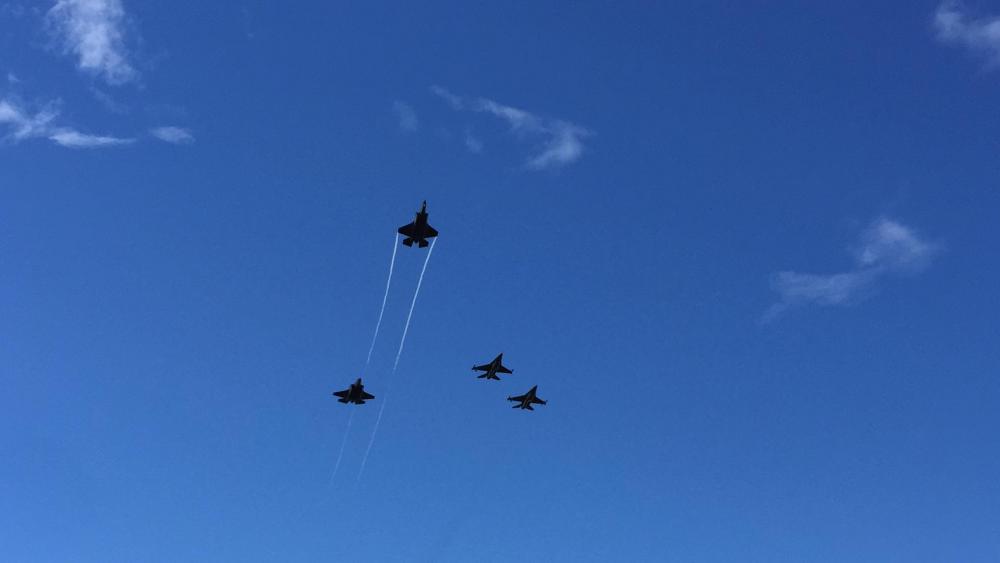Leaderboard
Popular Content
Showing content with the highest reputation on 12/08/2018 in all areas
-
I have no idea how you made it this far...or you’re still trolling. MLR.5 points
-
Holy hell... You don't know what happens at the MLR, but someone asked you to write a PRF? I'm feeling slightly better about my own chances, but the guy you were writing for is fucked.3 points
-
There's really not much point in having a big debate over PBS. If I managed to make a compelling enough argument that you threw up your hands and said, "JW, you're right - I wish we had line bidding back at AA", you're still going to have PBS at the end of the day. I just feel the need to point out that you really should caveat your positive comments about PBS and limit them to what you guys have successfully negotiated at AA. PBS in the industry is just as widely varied as all the other aspects of individual airline contracts. It's not accurate to say "PBS is great" without putting some qualifiers with that statement. According to you (maybe you can help to quantify your opinion with a seniority hack), AA pilots have done a bang-up job creating an awesome PBS. If the majority of pilots there share your viewpoint, good on you guys. Not every airline with PBS can make that claim. So, I continue not to try to sway your opinion, but to add some balance to the discussion and possibly offer new guys who are or eventually find themselves at a line bidding airline a differing perspective. I disagree that most arguments against it are based on misunderstanding or contractual issues. Maybe that's true at AA. But, you can't evaluate it across the industry in a vacuum simply based on it's own merits. Your only experience with it is at AA and according to you it's good. If you wanted to refute arguments against it at another airline, you would need to evaluate it's impact on the complete system in place at that airline - not just what schedules pilots end up with each month. One thing that kind of makes this an apples to oranges discussion is the significant variation in trip constructions at FedEx and UPS when compared to pax carriers. I would say that PBS is more suited to a pax airline. The concept of a "dream schedule" is probably only limited by one's imagination at AA. At FedEx, everyone's dreams (on a particular) aircraft fall into very similar patterns. So, it's very easy to build lines people want. Domestically, we basically work Mon-Fri, sometimes Sat. No one wants to work nights in a shotgun fashion, so we work week-on/week-off and so on. With a huge population of commuters (70%-ish), that works great - less commutes each month. Same for international. We have huge trips. Lots of them. Most pilots either work one 12-14 day trip or two smaller trips each month. There are a smaller number of lines for locals who prefer a higher number of shorter trips in a month. My point is, PBS generated lines according to individual pilot's desires would most likely look like they do now being built by our own pilots on the scheduling group. So, with all the negatives that come with PBS, we really have no reason to accept it. I don't know about AA, but here, no contractual changes are going to generate the same level of QOL improvement that we can by conflict bidding. Our contract already exceeds the FARs in every area. The "shortcomings" (as you call them) of line bidding create opportunities for more pilots across a larger seniority range to be able to manipulate their schedules - BEFORE trip trading, dropping, picking up trips is an option. As I emphasized by bolding your statements above, PBS is strictly seniority based which you accurately acknowledged and is a HUGE factor when evaluating the reality of PBS. There's something to be said for the "So, you're saying I've got a chance!" potential even if it's occasional as opposed to knowing, without a doubt, you're only going to get what your 93% seniority can hold. A final point - Airline management wants PBS.....badly. That should tell you something in and of itself. Many airlines that use PBS had it forced on them via bankruptcy contracts they had little to no choice in voting for. At FedEx, we continue to counter management's efforts to introduce PBS into our contract negotiations. We do that, not because we don't understand PBS - but because we do. In our case, it's not worth the cost in: pilots on our seniority list, time off during our vacation months, schedule flexibility for all especially junior pilots and having to waste negotiating capital to fend off attempts to enhance efficiency on the PBS scheduling algorithm every contract cycle just to get schedules similar to the ones we already get now.3 points
-
Troll is gone and posts are cleaned up. Back to a useful discussion about the flawless promotion system in the AF.....2 points
-
2 points
-
If guys flying with PBS like it, then good on ya. I liked PBS when I was flying with it at the regionals, but having had a few years to compare it to line bidding the purple way, I am a solid "no" vote for PBS at FedEx.2 points
-
2 points
-
While I'm not a fan of the Airbus (it is still having problems) and the fee-for-service mentioned in your previous post (ask the RAF about this) one thing is certain. The KC-46 will never replace either the KC-135 or the KC-10 in capability and in the numbers we have now. There are a few USAF reports floating around that discuss SLEPing KC-135s, retiring the KC-10 and replacing all KC-10s and some 135s with the KC-46. But like anything AF, it'll take a 69 different committees, tiger teams, SSS and TMTs to even start down the road of developing and executing a plan. The KC-46 is not a good replacement for either jet. And, IMHO, the AF is making a bad decision if they don't replace the KC-10 with a KC-10 like aircraft, especially when talking CORONETS or conventional long range support. But something has to be done, and I agree with you that we have got to find a good replacement for the KC-10. Maybe a little bit of competition will finally get Boeing motivated to unfvck the KC-46 and force them to look seriously at big wing military jets in the future.1 point
-
Why we didn’t think the boom operator needed a window to be able to see the receiver is beyond me. So what happens when the video system (after they finally get it working) has some sort of maintenance issue? The tanker becomes a real expensive and complex 767 freighter. Just put the damn boom at the back of the jet like we’ve been doing for 60 years. Sent from my iPhone using Tapatalk1 point
-
Mattis Erupts Over Niger Inquiry and Army Revisits Who Is to Blame https://www.nytimes.com/2018/12/07/us/politics/niger-mattis.html So anyone can drive onto Nellis AFB and security forces will not report it to anyone? I wonder who will be fired for this blunder. And these are the folks you want going outside the wire in combat...smh https://www.businessinsider.com/nellis-investigating-base-security-breach-alleged-kidnapping-2018-121 point
-
1 point
-
Bingo. Every airline wants more productivity per employee, less absenteeism, and greater control over costs and scheduling. Every airline wants PBS.1 point
-
No kidding. Just ask these guys.. https://www.google.com/amp/s/www.tampabay.com/news/military/macdill/air-force-blames-pilot-fatigue-for-c-17-landing-4-miles-from-macdill/1272014%3ftemplate=amp1 point
-
TLDR: Talk to an attorney, follow state law where you are stationed, get a CCW with good reciprocity, and don't bring guns on base unless you've done your homework (ask SFS/S2 for the base AFI supplement). 1) SOURCES OF ADVICE. Nobody can give you good DEFINITIVE advice on this topic other than an attorney licensed in the appropriate state. Don't ask cops, your buddy, security forces, or the internets. Especially if you're going to a blue state with lots of gun control, there is a lot of risk. A JAG is the next best, but if they're not licensed in the state or familiar with this area of law be ready for disappointment too. You will also want to do your own research: check the state's statutory law, check for case law, and get the base's firearms AFI supplement (from SFS/S2 typically). That said, I'll give you some free advice. 2) JURISDICTION & FEDERAL PROTECTION. Most states highly regulate CCW and/or open carry. You are generally subject to the state laws of where ever you are physically present with regard to guns. There is no federal get out of jail free card (other than LEOSA, which doesn't apply to most military people) with regard to state gun laws for military people. If you get transferred to, say, New York, and carry your handgun on a Florida CCW permit, you're committing a crime. Federal law will not help you, unless you can invoke the FOPA safe travel provisions. FOPA won't even help you in some states (like NY/NJ); you'll likely beat the charges but may not beat not the arrest (and seizure of your guns). THIS IS NOT A "GREY AREA" -- YOU GENERALLY HAVE TO FOLLOW THE STATE LAWS OF WHERE YOU ARE PHYSICALLY LOCATED. IN MANY STATES FIREARMS LAW VIOLATIONS CARRY FELONY CONVICTIONS. Some states have exceptions or carve outs for military in their firearms laws (for example, to possess standard capacity magazines in a state where they are banned, or carry a handgun without a permit or something). Nearly always these carve outs require you to be doing something in accordance with your official duties. That generally means in uniform, with authorization from your commanding officer on G-series orders. You MAY be able to use participation in a CMP service rifle/pistol event to qualify for "official duties." Talk to JAG/ADC, a local attorney, and your commander for that scenario. The FOPA is important to know about but won't protect you unless you're "just passing through." Bear in mind there is no federal protection for accessories, semiautomatic rifles, etc. So, if you own a 17 round mag (aka evil high capacity magazine) for your glock and an AR-15 with a flash hider (aka evil assault weapon) and get transferred to, say, California -- you better plan on getting a storage unit in Reno. In some states even simple possession of commonly owned firearms and accessories can be a serious felony. Plan ahead before a PCS to a blue state and scrub your HHG for "contraband" to separate it out before the movers come. 3) WHAT TO DO. Go read Handgunlaw.net for a quick summary before entering a new state. They are pretty good about summarizing things. There are a few scenarios you'll run into. - Constitutional Carry: Carry on, open or concealed, no permission slips required. - Unlicensed Open Carry: Carry openly, no permission slips required. Get a good holster like a Safariland ALS. You may want to exercise this right while you wait for a local CCW permit if you need one. - Permitted Carry (concealed or open): There are a few cases here, but the bottom line is you need some sort of permission slip to carry legally. You can either (A) get their CCW or (B) hold a CCW from a state they extend reciprocity to. We'll go from least to most restrictive in section 4. 4) RECIPROCITY SCENARIOS BEST CASE (other than constitutional carry): The best case is that the state extends reciprocity to holders of non-resident permits from states that are easy to get permits from. Georgia is an example. For example, you can get a New Hampshire non-resident permit by mailing them a check even if you've never been to NH. Florida non-resident is almost as easy. So just get a NH or FL non-resident permit by mail and you'll be good. I think its a decent idea for military members to maintain a FL, UT, or NH non-resident permit. The cost is fairly low, they're good for years, they're accepted across most of the country, and if something happens to your resident permit (can't renew, lose it, etc) then you're covered until you get your primary permit replaced. RESIDENT ONLY VERSION ACCEPTED : Bad news -- some states won't honor the non-resident version of the permit. They want you to hold a resident permit from somewhere, and they must have reciprocity from that state. Pennsylvania is a good example. They'll honor a Resident Florida permit, but not the non-resident version. This means that it behooves you to establish and maintain residency (and a resident permit) from a state that has wide reciprocity. Generally, your domicile is where you vote, pay taxes (indicated on your LES), and have an intent to return to. Many military folks have domiciles in TX, FL, or VA, so if that's you, you will want to get your state's permit. Be aware that establishing residency somewhere can have tax and other implications so be wise about it. Some states are easier than others to maintain "residency" for carry purposes. For example, if they want a requal or refresher training every few years or want you to show up physically at the sheriff's office for a new photo, that is a PITA if you now live halfways across the country. Some states will give a "resident" permit to military stationed in the state even if you don't establish a domicile there. Be careful that you don't mess up your domicile and end up with tax implications. You may have to surrender such a permit when you PCS. This is how South Carolina worked last time I looked into it. POOR OR NO RECIPROCITY STATES: As you get to more restrictive states, some of them won't extend reciprocity to many states, and a few have zero reciprocity. For example, Connecticut does not honor anyone else's permits. You must have a CT permit to carry there. In this case, you have to get their permit. Most of these states will offer a non-resident version. NO RECIPROCITY & "MAY ISSUE" PERMITS: The bad news is that if they have poor reciprocity, there's a good chance the permits are "may issue." That means the authorities "may issue" you a permit if they feel like it. I would highly suggest consulting an attorney or the local state 2A organization before you apply for a "may issue" permit so you know what you're getting into. If you go about it poorly then you may be rejected; this is bad because most other CCW applications will ask if you've ever been denied a permit, and you'll have to explain that Bumistan, NY denied your permit because they only issue to donors to the sheriff's election campaign and you didn't cut a check for the fundraiser. When you are PCSing somewhere, the county or city you live in may end up controlling the "may issue" process. By living one county over you may have a reasonable sheriff who will actually issue (this is often the case in California), so that may be a factor when you househunt. 5) DON'T INVITE THE MAN INTO YOUR LIFE AND KNOW YOUR RIGHTS. So -- context matters in this section. Know where you are stationed and what the local culture about firearms is like. Some other posters suggest disclosing the presence of a firearm to police all the time. I would instead suggest looking up whether you are required to do so. If you are required to do so, then tell them. Otherwise, don't bring it up. Its not relevant to your traffic ticket for going 40 in a 35 zone. Never, ever consent to a search or seizure. Discreetly record the encounter. Have an attorney on speed dial. If the situation allows, safely put the firearm and accessories in a locked container compliant with the FOPA before the traffic stop. This is vitally important if you're in a state that has gun laws that are difficult to comply with or carry draconian penalties, like those in the north east or west coast. Even if you THINK you've complied with all the restrictions and requirements there's a chance the cop could arrest you "just because." As an out of stater with out-of-state plates you may be at higher risk for being hassled as well. Once you've been arrested on a gun charge (even if its bogus and gets thrown out the moment your attorney shows up) then expect the military to drop administrative action on you, even if the criminal charges are later dismissed. The police may search anyways (Terry Frisk) so ensure you're in compliance with state laws regarding magazine capacity, etc. It also helps to make sure that any gun stuff in your vehicle is in a locked case (even a briefcase will do), which is not typically subject to a Terry Frisk. A previous poster said "concealed means concealed!" Well, guess what -- the cops can search you and the "grabbable area" of your vehicle for weapons with only "reasonable articulable suspicion." No probable cause or warrant required. That can land you in hot water quick in some restrictive states (think MD, NY, CA, etc). We're talking, typically, multiple felony charges for carrying a regular Glock 19 without a permit in one of those states. Which is probably career ending; even if your attorney cuts a deal to get you out of the worst state charges, I'd expect administrative action like an LOR from the military side. If you're in a gun friendly jurisdiction then there's less risk of the local police jamming you up on bogus charges or "going fishing" to find a technical violation, but if you find yourself transferred to somewhere like New York, Maryland, or New Jersey then you need to protect yourself from a legal risk point of view. This may sound a bit paranoid, but go buy the Area Defense Counsel lunch and ask them their opinion on volunteering information to the police during an investigative detention (aka "fishing expedition"). Every ADC and attorney I've ever talked to suggests keeping your mouth shut and never ever granting permission to search. Even police will typically admit that you shouldn't talk to them if they're questioning. If the police initiated an interaction with you, its likely not for your benefit. They're probably fishing. Google "James Duane" and "Don't Talk to the Police." This is tough for military folks as we are trained to be forthright and trust authority figures, especially other people in uniforms. Just be aware that the values and priorities of agencies vary highly across the country. As a military person don't assume that the values you grew up with in region X are the same as are shared by the people of State Y. 6) DEALING WITH BASE. As a general rule it is prohibited to bring deadly weapons into federal facilities, and its double plus illegal (felony) to bring them into federal buildings (18 USC 930). Generally bringing guns onto base (not into a building) contrary to policy is only a trespassing and Article 92 issue for violating regs. However, there are other federal laws that can kick in like the Gun Free School Zones Act. If on active duty you can expect at a minimum administrative action and potentially an Article 92 or other UCMJ action. Dependents can expect to be barred from base, formally trespassed from the property, and maybe some sort of misdemeanor charge (unlikely). There may be add-on state charges if there's dual jurisdiction. Note that the federal law allows possession if authorized. This is where the base commander comes in. The AF has chosen to allow each base commander to implement their own procedures/policy for their installation. There are three main flavors of policy: A) No carry other than official duties. If you aren't OSI, you ain't concealed carrying. B) LEOSA authorized. Some bases will let LEOSA folks carry. This is not most AF members. C) Something more permissive. Nellis is probably the best right now. They'll let any AD, reserve, guard member or dependent with a valid CCW bring their sidearm on base and store it in their vehicle for up to 24 hours. You can't carry outside your car but you can at least go to and from work with a gun. The Nellis policy allows a loaded gun to be stored so you can just take the whole holster off and lock up the holster & gun together -- no administrative gun handling that is likely to lead to negligent discharges. Some bases have rod and gun or hunt clubs. Its hit or miss what the rules are for that. I've actually seen a number of local policies where there was literally no way to comply with the base firearms AFI supplement and go shooting at the skeet club. The Security Forces just "selectively enforced" (i.e. chose not to enforce) the policy forbidding firearms. In other cases there are hoops to jump through (registration, etc). Usually you must travel directly from the gate to the range and then out (so you can't throw your guns in the trunk and go shooting after work). If you live on base, there is often a provision for registering your firearms and either storing them in the armory or transporting them to your quarters. There are often storage requirements. If you are TDY there may be an option to store firearms in the armory; it often requires a CC's signature on the standard registration form so coordinate before going TDY. Many bases want the guns unloaded and cased separate from ammo before you go to your quarters/the armory/the rod and gun club. This can be dangerous for the CCWer in an enclosed vehicle -- any administrative handling brings a risk of a negligent discharge. When I lived on a base where this was the policy I actually got a gun with an external safety as it provided one more layer between me an a negligent discharge in my car. Another strategy is empty chamber carry -- I don't recommend it because a gun in condition 3 is basically an expensive club, but it does make clearing the pistol faster and easier in the car before you go through the gate. I'll shamefully admit when I lived on base occasionally I did this out of laziness more than anything else. If you think your base's policy should be updated then I encourage you to contact your chain of command and the security forces S2. Ask for a copy of the policy first so you can read it carefully. Draft some suggested changes and have a JAG look at them over lunch. Copying the Nellis AFB policy would be a fantastic start for most places. 7) I HEARD CCW WAS AUTHORIZED ON BASE NOW THOUGH! Fake News. In the closing year of the Obama administration, the Pentagon updated DODI 5210.56 to theoretically allow a pathway to CCW on base. Read DODI 5210.56 carefully and you'll find that its a process that is nearly impossible to comply with, and needs to be re-authorized on a regular basis. I'd be shocked if anyone actually is carrying anywhere in DOD under the new DODI 5210.56. Spoiler Alert: Making it easier to carry guns was not a priority for the Obama administration. This is just my guess, but I suspect that they just decided to get out in front of this issue as Congress was starting to make noise about putting something in the NDAA. Rather than accepting whatever Congress came up with (which might actually let people carry guns on base) the administration decided to draft something that on the surface looks like there's a way to carry (and they got a ton of press about it, and defused congressional action entirely), but in reality is so convoluted and impossible to comply with that in practice it will never happen. I am not aware of any changes to DODI 5210.56 in the last two years. Despite much talk from senior leaders the actual process is the same. I'll also say that most commanders will inherently be risk averse about this. After the Ft Hood shooting the base commander was promoted. The fact is that if a bunch of military folks on base get shot up then its an unpredictable unpreventable tragedy, or maybe some intel agency's fault. If the base/CC allows carry of some sort and one guy has a negligent discharge on base, then that base/CC is probably toast. It takes a commander with courage and a certain set of values to trust their personnel to transport firearms on base. Finally, there are some programs like the unit marshal program that you can ask your CC to look into. That entails getting some folks in the unit officially armed up with issue sidearms at work as a randomized force protection measure. Its not really "CCW on base" when you go to the commissary but it is a valuable FP tool. 😎 GOOD NEWS. The NDAA a few years ago prohibited commanders from making rules about your guns OFF BASE. This stemmed from US Army Alaska (and a few other places) forbidding soldiers from carrying even off-duty, off-base and making rules about storage, etc. What you do off base is your business. When buying guns, you are considered to be a resident of where your PCS orders station you. This means you can buy handguns or long guns where you are stationed. 9) A FEW USEFUL THINGS Having an FFL03 (Curios and Relics) license can be quite helpful. It costs $30. The value for military members is two folks: 1) You can acquire C&R guns (older ones) in interstate commerce. That means if you're TDY somewhere and see a neat older gun you can get it. There are some handguns that could be pressed into self defense roles (CZ82 is probably the best) on the C&R list, and in a few years, ARs and Berettas will start coming onto the list too. 2) Common carriers (UPS, etc) often want to mail from an FFL to an FFL. If you have an FFL, then they'll accept your package to mail a gun to yourself. Shipping a gun to yourself is often the easiest way to deal with certain PCS scenarios. If you don't have the C&R 03, then the common carrier may not let you ship through them, so you'll have to pay a FFL to do it for you. The FFL03 takes a few weeks to get in the mail so plan ahead if you have a PCS coming up. Especially useful if you don't want to hand carry guns through somewhere like Canada or New York, and if you don't want the movers handling them. Consider joining something like Armed Citizens Legal Defense Network. I like ACLDN because they have a bunch of local attorneys in their rolodex. When you move every few years its handy to have that kind of info to throw into your phone before a PCS. About me: I'm an NRA instructor (to include the Personal Protection Outside the Home course) and have dealt with CCW across the country from the northeast to Constitutional Carry land. I've also worked with attorneys on CCW issues. I've dealt with the hoops to hunt on base, and spoken with wing kings and JAGs about on base carry policies (and how to improve them). I've also worked force protection with the security forces, know the AFIs, and have helped coordinate on local base policies.1 point
-
For those of us with a safety shop that doesn't believe in using the safety process to prevent mishap and won't let you read mishap reports: https://www.militarytimes.com/2018/12/05/investigation-blames-air-force-and-navy-for-systemic-failures-in-fatal-marine-corps-c-130-crash-that-killed-16/ The horrific KC-130T plane crash that killed 15 Marines and a sailor last summer was caused by a deteriorating propeller blade that was corroded when it entered an Air Force maintenance depot in 2011, but workers there failed to fix it and sent it back to the fleet unrepaired. This neglect allowed a routine corrosion problem to metastasize into a crack that went undetected for years until a mundane cross-country transport mission ended in flames. On July 10, 2017, that worn-down blade finally failed and came loose from the propeller 20,000 feet above Mississippi farmland, as the Marine Corps Reserve plane was en route to California under the call sign “Yanky 72.” It shot into the side of the aging aircraft, one of the last 130Ts still flying, a model set to be retired in the next few years. The blade’s impact set off a cataclysm that killed everyone on board and left the aircraft in three pieces, creating inconsolable heartache for 16 military families and an inferno of wreckage scattered for miles.1 point
-
It appears that the FTU/convening authority think your flying skills are sub-par and don't wish to pass you on to the next/3rd airframe which could also potentially be a challenge for you. I have been a reviewing/voting member (whatever that role is specifically called) on an FEB and IMO it's a pretty fair process. The board members, covening authority, and the MAJCOM CC will take this process very seriously and most likley give you the benefit of the doubt, not to mention they are also very aware of the pilot manning situation. If your record shows that you should be reinstated/keep your wings, then that is what will happen. Good luck and make sure you are taking care of yourself outside of the FEB process by going to the gym, eating well, getting adequate sleep, keeping positive relationships, etc.1 point
-
Everyone has an opinion, so here's a differing one. It can be a good system but your statements are way too general. There's much more that goes into being able to say "PBS is great". Someone just breaking into the airline biz needs to understand that. Knowing what I know now, if I had a choice of two identical airlines - one PBS and one line bidding, I'd steer away from PBS every time. Ask any UAL pilot what their first iteration of PBS was like and I doubt you'll find any who were junior who say it was "great". The top half of the list bid for what they wanted which typically involved a balance of days off and work. This resulted in an abundance of flying left to assign by the time they got to the bottom half of the pilots. So, junior pilots were maxed out every month flying 90 hours of hard time. To make matter worse, since most flying was assigned, there was very little open time so trip trading was close to impossible. I imagine it's gotten better there, but that's completely up to the negotiating power of the pilot group. The bottom line is anyone working under PBS doesn't have a choice, so the only option is to make it as good as possible. That falls on smart pilots negotiating the rules, a good software program to follow those rules and the ability to continually update and improve when appropriate. If you have those, then as you said, it can be great. However, PBS will be manpower negative by virtue of the efficiency it brings. Less pilots at an airline is rarely a good thing. That efficiency will typically result in less open time and reduce the ability for people to massage their schedules. In the unicorn, ice cream and blowjob world, no one under PBS would need to massage their schedules because everyone gets what they want. The reality is, that everyone gets what their seniority can hold - far more strictly than under a line bidding system. My situation is a perfect example. Under PBS, I get what my 40% seniority can hold - period dot. Under line bidding, I can go that route if I want to put minimal effort into my schedule. However, I also have the option to bid conflicts or a secondary line and use the necessary follow on bidding process used to fill uncovered trips to effectively increase my seniority and access trips I couldn't get under PBS. Senior pilots get what they want under either system, so their opinions on which one they prefer matter far less. Ask the real junior guys what they like. Some know nothing different, so they may not have an answer. The bottom line is, with line bidding, there are more options available for the junior pilots to create a schedule that suits them than simply relying on what their seniority can hold via PBS. Trip design and typical schedules at FedEx aren't the same as the pax world, so that may be another reason why it wouldn't work very well here. When it comes to vacation, there's no way that a PBS system can generate the same results as the one at FedEx using line bidding. PBS would decimate our vacation system. I can take the 4 weeks of vacation per year I have now, put them in 4 different months and take all 4 of those months off with full pay. Do that with PBS. No pilot at FedEx who truly understands all the implications would ever vote for a PBS system. That's not out of ignorance or not bothering to learn the system. The only way it would come to be there is the same way it came to be at many of the airlines that use it now. It was forced on them during bankruptcy negotiations. If pax guys have been able to take those lemons and make lemonade, good for them. I'm happy PBS is working for them. I effectively use a version of it when I bid for my secondary lines since the process is similar. Take a pot of uncovered trips, put in for specific trips or general "here's what I want and/or when I want to work" and you get what you can hold. Everyone doing that at FedEx would completely suck.1 point
-
^ what he said: actual conversation with a CA: CA: I hate PBS and the optimizer. It makes me work 4 on 3 off and I always get min time 11 hour layovers. Me: You're 30% in seniority, you can do line bidding and get most of the sequences you want. I brought my GF to my 28 hour layover at a Miami Beach hotel. CA: I’m too lazy to look through all the bid sequence Me: You can set standing bid preferences in PBS so you can set it and forget it. CA: I don’t know how to do that Me: The company has CBTs they pay you extra to do CA: I’m too lazy to do that ¯\_(ツ)_/¯ some people just want to be miserable.1 point
-
Agreed. The fact that we have a secondary process means we don't have PBS which is worth far more to most of our pilots than some having to get their schedules late. FedEx doesn't use a strict calendar month - rather, 28 and 35 day cycles (Monday to Monday) that may result in the month in question containing a few days of an adjacent month or months. This December is a 5-week month and goes from 26 Nov to 30 Dec. So, it's not possible to say we get our schedules on the "15th of each month" or any other specific date. Lineholders, including reserve lines, (about 80% of pilots in any particular seat) get their schedules 19 days before the start of the month, so I guess that would be the pax equivalent of getting them on the 11th or 12th of the month. The "cats and dogs" process that occurs due to conflicts are resolved over the next week with the last of those notifications happening 13 days out. The final one is the secondaries which I already mentioned. Obviously some people's lifestyles require early information about their schedules, like our OP. They would most likely avoid our secondary lines if they have the option. I'm in the top 40% of my seat and I still bid secondary lines routinely. I can live with the late notification because I get a huge bump in seniority in exchange. I'm usually in the top 5 of secondary lines which gives me a very good shot at getting what I want, when I want it and much higher quality trips than if I simply bid a line. I guess maybe that's why I'm okay with the late notification. Knowing I'll get what I want probably makes not knowing exactly what that is a bit easier to handle than someone at the middle or back of the secondary pack rolling the dice and have zero clue until 5 days prior. Which was the whole point of my caution to the OP - not scheduling 101 for FedEx, but I took the time to type it now, so here it is.1 point
-
1 point














